Mary has requested that the daily message be
given each day to the world. It is read nightly at the prayer service from her Image
Building in Clearwater, Florida, U.S.A. This is according to her request. All attempts
will be made to publish this daily message to the world at 11 p.m. Eastern time, U.S.A.
We acknowledge that the final authority
regarding these messages rests with the Holy See of Rome.
|
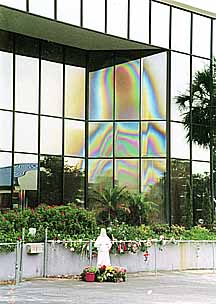 |
November 18, 2000
A Prayer for Intimacy
with the Lamb, the Bridegroom of the Soul
Oh Lamb of God, Who take away the sins of the world, come and act
on my soul most intimately. I surrender myself, as I ask for the grace to let go, to just
be as I exist in You and You act most intimately on my soul. You are the Initiator. I am
the soul waiting Your favors as You act in me. I love You. I adore You. I worship You.
Come and possess my soul with Your Divine Grace, as I experience You most intimately.
Messenger: Include Our Lady of the Holy Spirit
Center in 6:20 prayers.
Messenger: Please pray for 5 urgent intentions!
Messenger: Please pray for the healing of Father Carter
through the intercession of Our Lady of Clearwater.
Messenger: I give my heart to Jesus and Mary with you in love. Jesus is always
telling us things for a good reason. We must pray for Father, his next round of chemo
begins Tuesday and I do a healing rosary in Sidney, Ohio that day. He said that
rosary last month was a turning point for him. At 3:45 Tuesday, Fr. Mike will say a Mass
for Father. The Sidney, Ohio rosary will begin at 6:20. We all need to join in a
bead-by-bead healing rosary Tuesday at 6:20. Somebody please tell Iowa, fax them this
note. Also, Walter usually has a Mass going on sometime around the prayer meeting on
Tuesday. The Mass at 3:45 IS FOR FATHER, if you can come or if you can pray a short
healing rosary if possible then, pray a rosary. If you can't, unite what you are doing
with the Mass and all Masses going on at that time.1ST PRIORITY IS—DO A HEALING
ROSARY BEAD-BY-BEAD FOR FATHER CARTER AT 6:20 TUESDAY, please get this fax to Fernando,
Marian, Ron, Ed C., all you can to pray with us. Teaching through Father's books and notes
is important for all of us and the world, please pray for this, please pray for this!!
Pray for a special priest, he will get a package MONDAY at noon, please pray for Bishop
Ed YOU MUST PLEASE PRAY FOR THE BUILDING AND ALL TO
DO WITH THAT. PRAY FOR THE NEW YORK PRISON MINISTRY AND ALL PRISON MINISTRIES, PRAY FOR
HANK AND THE PRIEST, ALL INVOLVED. Please read the daily message November 18, 2000 –
it is very important.
We have been working so hard on organizing and saving old messages, please pray for
this, please we need your prayers.
Marian is scanning in the books and maybe Nick will help and the whole team in Morrow,
Ohio and China, Indiana are involved, please pray for this.
Oh I love you so much and Jesus thanks you for being His beautiful servants and brides.
Please pray for Sheila and Steve.
Pray for Fr. Mike and Fr. Bill and all priests doing Tuesday Masses in Dale, Indiana.
Pray for funds, we desperately need them.
I love you.
The Messenger.
November 18, 2000 - Second Message
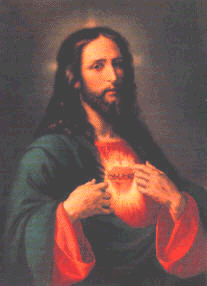
Jesus speaks: Dear apostles,
I want you to pray for your founder.
I want to teach the world as I taught through your founder these past
thirty years.
The writings of your founder are important to the renewal of the Church
and the world.
You will be taught as I teach through his writings about the Christian
life and daily living.
This is a gift I give to the Church.
Pray for this gift.
These writings and the writings of My messenger will be translated in
all languages.
Pray for this. Pray and have faith. Do not lose heart.
I am God. This is the plan of the Father to help renew the Church and
the world.
December 17, 2000, is very important to the world.
I desire My messenger to go to Iowa, Pennsylvania, Sidney, Ohio; New
York, Denver, Colorado; Dale, Indiana and Michigan.
I desire the Imprimatur material to be translated as I so direct.
Pray for bishops and priests to help get the writings of your founder
and messenger to the people, to the churches and schools.
Do not fear —
Have faith.
I love you,
Jesus.
Included at the end of this message Chapter 1 from the book written by
Fr. Carter, The Pain and the Joy.

Jesus speaks: Also, Chapters 1, 2 and 3 from the book,
Response to God's Love.
Please, please realize this is a great gift I give you, pray for all
involved in bringing this to you on the Internet team, Marian and possibly others. Please
pray for them. This will help to further your study into the spiritual life. This is for
the renewal of the Church and the world.
Your founder has been directed by Me for this mission since he took his
pen in his hand.
Pray for his healing, his recovery, in part, fully, pray to your God.
The gifts I have given through him and My messenger have not been
appreciated. Tell your God this Thanksgiving how you are pleased for all I have done for
you and for My Movement, Shepherds of Christ. Be grateful. Thank God for Mary on the
building. YOUR FATHER WAS ANGERED WHEN THERE WERE NOT FUNDS FOR THE PRIESTLY NEWSLETTER
WHEN HE ASKED THE WORLD FOR THEM.
YOU MUST PRAY AND OFFER SACRIFICE TO GOD FOR THE GIFTS YOU HAVE BEEN
GIVEN.
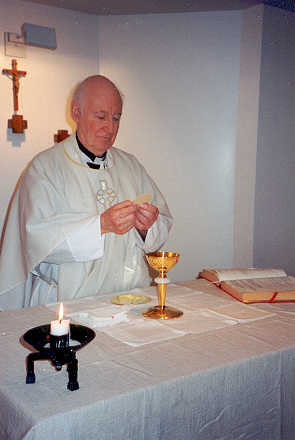
JESUS CALLS OUR FOUNDER "THE
BREAD OF LIFE PRIEST".
—
JESUS GAVE ME THE MESSAGE SEPTEMBER 91 "FEED THE HUNGRY" |
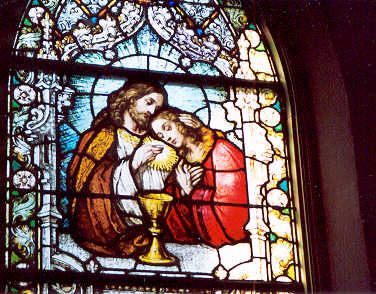
Jesus speaks: BY OFFERING SACRIFICE I MEAN—OFFERING YOUR
LIVES UNITED TO THE MASS PRAYING THROUGH OUR LADY OF CLEARWATER. UNITE YOUR LIVES TO THE
HOLY SACRIFICE OF THE MASS BEING OFFERED AROUND THE WORLD.
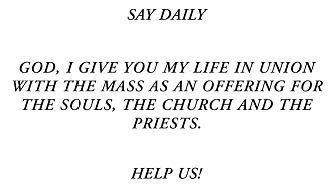
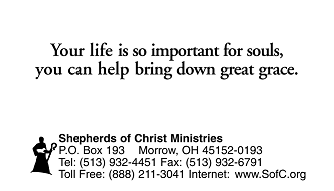
Jesus speaks: I am Jesus, help me. Your Father wants the world to
support this effort financially.
There was not money for the priestly newsletter when He begged for
money.
Your world is suffering in Florida NOW.
Take the mud out of your eyes and see the Virgin Mary on the building.
She leads you to My Movement, My newsletter, My revelations.
I have attempted to reach man here to help bring about the completion of
the mission My Mother began at Fatima.
Funds are needed desperately. If you want to help, please help this way.
I love you.
Jesus.
Messenger: December 17, 1996, Mary appears on the building in
Clearwater, Florida.

December 19, 1996 Message from Mary
Mary speaks: My dear children, I give to you, my Son, Jesus, born in a stable in
Bethlehem on Christmas morn'. He is the Almighty God, the Light of the world.
I appear to you, my children, on a (former) bank in Florida. You have made money your god!
Do you know how cold are your hearts? You turn away from my Son, Jesus, for your money.
Your money is your god.
I am Mary, your Mother. I do not appear as I once appeared to you. I am asking you today
to circulate my message given on a tape on the feast of Our Lady of Guadalupe, December
12, 1996. Please circulate this tape now. Give it to as many people as you can. I am Mary,
your Mother. Please circulate my Rosary Book.
The tape Mary's Message December 12, 1996, can
be ordered at no cost from the address below. We operate on donations only.
November 18, 2000 - Third Message
Mary speaks: My children of America, My children, I am the Lady of
Florida, I appear for a reason.
How much will you fight before you see the light?
My Son is the Light of the World.
My Son is Jesus, He is the Son of God.
My Son is the King.
NO MAN IS ABOVE HIM.
GOD IS SUPREME, GOD IS ABOVE ALL.
I am Mary, your Mother.
Excerpt from November 15, 2000 Daily Message
Messenger: Response to God's Love is a book written by Fr. Carter and
used as a text book for about 16 years at Xavier University. He taught there for over 30
years. He has authored some 17 books and written six years of priestly newsletters which
have been circulated around the world.
Jesus desires this section to be included. This book is so important to Jesus. You will
have greater insights into the Divine Mysteries if you read slowly as Jesus requests and
pray for vision and grace. Oh God, thank You for this great work.
The moment Fr. Carter took his pen in hand God was giving the world a great body of
knowledge to help renew the Church and the world.
Fr. Carter has spiritually directed all of us through his writings and Jesus has
directed him his whole life to help renew the Church and the world.
St. Claude de la Colombiere, St. Margaret Mary, St. Francis, St. Clare, St. Ignatius
and St. Xavier intercede for us, especially for the Jesuits to help us do this work to
help bring about the Reign of the Sacred Heart and triumph of Mary's Heart.
(End of Excerpt from November 15, 2000 Daily Message)
November 18, 2000 - Fourth Message
A Course in Christian Living — from studies of
the founder.
Messenger: I wish to propose the reading of Chapters 1, 2, and 3
in Response to God's Love. These chapters can be read over the course of a week.
These three chapters will appear at the end of this message.
We are studying Christian life and how we live it.
Our object is to establish a comprehensive view of what is necessary for
the maintenance and development of full Christian living.
This is an outline from Father Carter's class.
It is not complete - it is only an outline.
Introduction: What is Theology?
A. Science
1) Definition - A science is an
organized body of study about a
particular area of intellectual inquiry with its own
methodology according to which it organizes its
truth and further pursues its truth
2) Analysis and Synthesis - Each
science is concerned with analysis and synthesis
a.) ANALYSIS is
the examination of the matter
ANALYSIS breaks down the subject matter into its parts for
a
better understanding of the parts
b.) SYNTHESIS
puts all the parts together in an intellectual picture
3) Divisions - For example,
chemistry is divided into
1) organic 2) physical 3) inorganic, etc.
B. Theology is a science
1) Definition - Theology is
the organized study about God and
everything in relation to God
Through its
methodology it organizes its truth, etc. . .
Its
methodology is different than anything else
because it is based on SUPERNATURAL THINGS
2) Analysis and Synthesis - God's
truth revealed in Christ is profoundly unified
3) Division -
This course
will deal with theology and practice of full
Christian living, that is, living as a
Christian in every day life
This course
deals with the practice of Christian life,
relative to the revealed truth of Christ
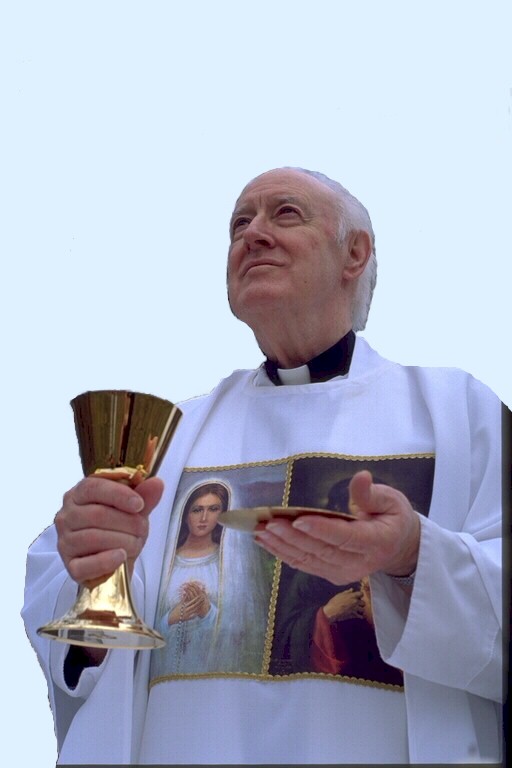
Through Him, With Him and In Him
Excerpt from The Pain and the Joy
1
Jesus and the Christian
We are currently witnessing a resurgence of interest
in popular psychology. Psychology books for popular audiences have flooded the market in
recent years. Of course, this proliferation of psychological literature is commensurate
with readers' demands for such material, and such, signifies that there are numerous
individuals interested in a more complete understanding of the workings of the human
psyche. People want to learn how to cope more successfully with emotional problems, how to
relate with others in a more mature and satisfying fashion, how to develop into fulfilled
individuals.
As contemporary Christians, we are obviously exposed to
the influence of these publications, but we must take a balanced attitude toward this
literature. On the one hand, we realize that psychology can certainly tell us much that is
true and helpful concerning the behavior of the human person. On the other hand, we should
realize that a certain portion of psychological literature is either indifferent or even
hostile toward religion.
Even when we assimilate what is good from psychology
concerning the human person and human behavior, we must still realize we do not possess
the entire truth regarding the human personality. As Christians, however, we do have a
source which gives us the ultimate truth concerning what it means to be human. This source
is Christ Himself; Jesus is the supreme personality theorist. He is the one, who, by His
teaching and example, tells us what human life is really all about, how we must think and
act if we are to satisfy that consistent yearning for fulfillment and happiness which is
etched deeply within the human heart.
Jesus leads us to personality fulfillment, not by removing
us from the human condition, but by teaching us how properly to live within it. Sometimes
we are tempted to think that the best way to be a good Christian would be to withdraw as
much as possible from earthly concerns. We think how peaceful it would be to dwell alone
with God in our own kind of hermitage, and allow the world with all its worries,
anxieties, and temptations to pass us by. In moments of clear reflection, however, we
realize this is an unrealistic kind of thinking, thinking which does not correspond to
Christ's redemptive plan (indeed, even the cloistered contemplative must properly
encounter the human situation).
Jesus redeemed us within the framework of the human
condition. Jesus' enfleshment placed Him within the world of the human, and He accepted
the implications of His manhood. He lived His humanity to the fullest by always doing His
Father's will with love. He lived a full human life not only when it was pleasant to do
so, but also when this meant being nailed to a cross in excruciating agony.
All of Jesus' human acts contributed to His redemptive
effort: His relationships with Mary, Joseph, and others; His taking meals with friends;
His gathering the little children to Himself in warm embrace; His healing of the sick; His
thrilling to nature's beauty; the sufferings of His passion and death. Yes, these and all
His other human acts redeemed us.
As Jesus objectively redeemed us within the framework of
the human condition, so in like manner we subjectively participate in redemption. We live
the life Jesus came to give by experiencing humanity according to God's will. We are
saved, not by fleeing from it, but by embracing it according to God's designs.
As Jesus did before us, we also must accept the human
experience not only at those times when life rewards us with joy, success, enthusiasm, and
the beauty and tenderness of life. When we experience failure or misunderstanding, when we
taste the bitterness of human existence, when life seems all too much for us, when anguish
and intense suffering make even one day seem endless—at these times also we must
affirm our being human. In this way we are saved. In this way we help others be saved. In
this way we follow Jesus, who is both God and man.
If we are to live the human condition properly, we must
live it according to the vision of Christ. Indeed, Jesus came to give us a new vision. As
we are drawn into the Jesus experience by God's merciful love, we are graced with a new
way of looking at things. We must allow this vision to consistently shape the way we view
persons, places, things, and events.
It is not always easy to live according to the vision of
Christ. There is much in the world which is opposed to the teaching of Jesus. If we do not
take the proper precautions, the false views of the world can gradually blur the vision
Jesus has granted us.
A worldly false view, for instance, tells us that we are
successful only if we are successful in the external order of things. Christ's view tells
us that we are really successful only if we live according to His Father's will.
A worldly false view tells us that the more material
things we possess, the more fortunate we are. Christ's view tells us that material things
are worthwhile in proportion to their helping us live the life He came to give us, and
that we must exercise a constant vigilance lest material possessions become an end in
themselves rather than a legitimate means to a noble goal.
A worldly false view presents a hedonistic pursuit of
pleasure and an avoidance of suffering at all costs as an ideal to be pursued. Christ's
view assigns pleasure its legitimate place within God's plan for human existence, but
simultaneously reminds us that suffering is also a part of the human condition, and we
must take up our cross daily and follow Him.
A worldly view uses others in a manipulative fashion,
telling those who would listen, to use others for the attainment of selfish goals.
Christ's view reminds us that each person is made in the image of God, possesses a
priceless dignity, and should be loved accordingly.
A worldly view has no time for meditation and
contemplation, considering such exercises a waste of time—the occupation of pious
individuals who lack the shrewdness and toughness to accomplish successfully in the arena
of worldly competition. Christ's view persistently reminds us that prayerful communication
with our transcendent God is necessary for a truly human existence.
Christ's view of reality must affect not only the
intellectual aspect of our being, but must permeate our entire persons, if indeed we are
to be mature Christian personalities. In this regard we can make a distinction between a
notional assent and an existential assent regarding our acceptance of Christ's vision.
With a merely notional assent our intellects do indeed accept Christ's truth. But this
notional assent does not influence our entire persons in a consistent, dynamic fashion. We
believe in Christ and His teaching, but there are numerous areas of our existence which do
not, in a consistent fashion, come under the influence of Christ's truth.
With an existential assent, on the other hand, we assent
to the truth of Christ, not merely in the intellectual dimension of our personalities, but
with our entire being. Through a proper asceticism and a life of meditation and
contemplation, we allow the truth of Christ to more and more penetrate through the ugly
layers of the errant self to the vibrant realms of the true self in the center of our
personalities. This existential assent to the truth of Christ, is what allows our true
personalities to emerge and to influence what we think, say, and do. Faith, hope, and love
more and more exercise their purgative, illuminative, and transforming effects upon our
personalities, and, consequently, the words of St. Paul increasingly have meaning for us:
. . .yet I live, no longer I, but Christ lives in me;
insofar as I now live in the flesh, live by faith
in the Son of God who has loved me and given
himself up for me. (Gal. 2:20).
As Christians then, we are called to transformation
in Christ. This obviously entails a friendship with Jesus, one which becomes increasingly
close.
Friendship is a process of self-liberation. As I give
myself to another in friendship, I am aided in the process of escape from my false self. I
am aided in the process of achieving true self-identity. The facade of the false self more
and more recedes through the dynamics of friendship. Why is this? When another receives me
in friendship, that other receives me as I am. The friend loves me in my good points,
loves me despite my bad points. In the warmth of this receptive love, I am encouraged to
be and to become my authentic self. I do not have to project a false self in the hope that
such an image might be more acceptable to the other. Rather, I am encouraged to take the
risk of being my true self, since I know the other will not reject me. Actually, my true
self is more attractive to the friend and to others precisely because it is my authentic
self—the self God destines me to be, possessing the personal uniqueness with which
God has permeated my being.
Friendship, therefore, increases my freedom—the
freedom to be my real self. The deeper an authentic friendship, the more I am encouraged
by the other's love to be and to become. I am encouraged to exercise my talents and to
develop them to ever greater heights in the loving service of God and others.
If friendship with a human person increases my growth
potential, what are we to say about friendship with Jesus? There is no comparison. Jesus
offers me such magnificent opportunities for growth. The more I am aware of Jesus'
tremendous and personal love for me, the more secure I feel in developing my real
self.
Being accepted by Jesus as a friend should radically
change my life. As Jesus has given Himself entirely to me, so I should give myself
entirely to Him. This deep and intense friendship accomplishes my ongoing conversion, my
transformation. This friend Jesus, through the strength and tenderness of His love,
gradually and increasingly draws me out of my selfish traits. He gradually makes me freer
to really be. He increasingly assists me in allowing my Christic, Trinitarian self to
emerge more and more in expressions of love for God and neighbor.
As I share the pleasant experiences of life with this
friend Jesus, He enhances their joy. Being loved and accepted by others, enjoying the
challenge and success of work, experiencing simple joys as well as moments of overwhelming
happiness, drinking in the breathless beauties of nature—these and all such
experiences take on deeper meaning in the presence of Jesus.
As I share the difficult aspects of human life with Jesus,
He lessens their burden. If Jesus is my friend, should I ever capitulate to
discouragement. If Jesus is my friend, should a sense of failure ever extinguish my
determination to struggle on? If Jesus is my friend, is there any cross I can claim is too
heavy? If Jesus is my friend, can I ever allow suffering to make me bitter?
As I strive to grow into a mature Christian, this friend
Jesus is profoundly present to me. He is strong, tender, understanding, gentle, loving. He
sympathizes, encourages, challenges, inspires. He leads, but does not force. He admonishes
us when we are wrong, but He does not reject us. He is overjoyed at our good deeds, yet
gently but firmly reminds us that there is still much to accomplish as He guides us in the
Spirit to the Father. Jesus is the perfect friend. He is your friend, and my friend.
An excellent way to grow in our relationship with Jesus is
through devotion to His Sacred Heart. Christ shows us His Heart as symbol of His love. In
His great love for us He asks for our love in return. Can we refuse? Can we refuse this
Christ who, out of love for us, experienced the piercing of His Heart on a hill called
Calvary? Christ gave Himself entirely. Nailed to the wood of a cross, He poured out His
life. Christ did this for love of us—for you, and for me.
As Jesus gives Himself so completely to us, it is
entirely fitting that we make a return gift. It is entirely proper that we give ourselves,
out of love, to Him. This total gift of self is called "consecration."
Consecration to the Heart of Christ is the gift of ourselves and all of our faculties to
Christ. We in effect say, "Jesus, take me whole and entire. Out of love I give myself
entirely to You. Live in and through me. In love You have given Yourself completely to me.
In love I give myself completely to You."
To aid us in living out our consecration to the Heart of
Christ we should also consecrate ourselves to the Immaculate Heart of Mary. At Fatima Our
Lady revealed that Jesus desires that devotion to the Immaculate Heart exist together with
devotion to His own Heart. Our Lady of Fatima promised the great gift of salvation to all
those who practice devotion to her Immaculate Heart. The highest form of such devotion is
consecration to Mary the Immaculate Heart.
Through this consecration we give ourselves entirely to
Mary so that she may lead us ever closer to the Heart of her Son. Consecration to the
Immaculate Heart, then, is a great help in the living out of our consecration to the Heart
of Christ in an ever progressive way.
All we shall say in the following pages has a relationship
to living out this consecration to the Heart of Christ and to the Immaculate Heart of
Mary. Christ and Mary—how much they love us! They reveal their Hearts as symbols of
this love. They ask for our love in return. They invite us to live within their Hearts. If
we accept their invitation, we experience love and peace despite the painful aspects of
life. We experience security. We experience joy and happiness. Yes, Christ and Mary invite
us to live within their Hearts in order that such a life may be ours. Who can refuse their
invitation?
(End of Excerpt from The Pain and the Joy)
Excerpt from Response to God's Love
1
The Mystery of Christ and
Christian Existence
Etymologically, the word mystery basically means that which is secret or hidden. It
was used in a religiously technical sense even before Christianity. Mystery was used, for
example, to designate certain religious rites of pagan Hellenism, secret rites that were
closed to outsiders unless they had been properly initiated into them. In relation to
Egyptian hermeticism, the word mystery was applied to initiation into secret religious
ideas or doctrines. In reference to Christianity, God himself is the ultimate mystery.
Radically, God is completely other and transcendent, hidden from man in his inner life,
unless he chooses to reveal himself. Let us briefly look at this inner life of God.
The Father, in a perfect act of
self-expression, in a perfect act of knowing, generates his son. The Son, the Word, is,
then,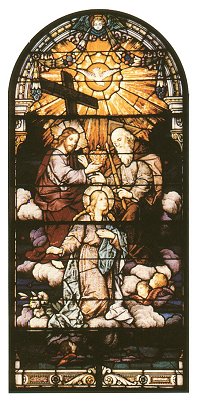 the immanent expression of God's fullness, the reflection of the
Father. Likewise, from all eternity, the Father and the Son bring forth the Holy Spirit in
a perfect act of loving.
the immanent expression of God's fullness, the reflection of the
Father. Likewise, from all eternity, the Father and the Son bring forth the Holy Spirit in
a perfect act of loving.
At the destined moment in human
history, God's self-expression, the Word, immersed himself into man's world. God's inner
self-expression now had also become God's outer self-expression. Consequently, the mystery
of God becomes the mystery of Christ. In Christ, God tells us about himself, about his
inner life, about his plan of creation and redemption. He tells us how Father, Son, and
Holy Spirit desire to dwell within us in the most intimate fashion, how they wish to share
with us their own life through grace. All this he has accomplished and does accomplish
through Christ. St. Paul tells us: "I became a minister of this Church through the
commission God gave me to preach among you his word in its fullness, that mystery hidden
from ages and generations past but now revealed to his holy ones. God has willed to make
known to them the glory beyond price which this mystery brings to the Gentiles—the
mystery of Christ in you, your hope of glory. This is the Christ we proclaim while we
admonish all men and teach them in the full measure of wisdom, hoping to make every man
complete in Christ" (Col 1:25-28).
The Christian life, then, is
rooted in the great event of the Incarnation. We must, consequently, always focus our gaze
upon Christ, realizing that everything the Father wishes to tell us has been summed up in
the life of Jesus of Nazareth. It only remains for us, then, to fathom ever more deeply
the inexhaustible truth of the Word Incarnate: "In times past, God spoke in
fragmentary and varied ways to our fathers through the prophets; in this, the final age,
he has spoken to us through his Son, whom he has made heir of all things and through whom
he first created the universe" (Heb 1:1-2).
What was the condition of man and
his world at the time of Christ's coming? In some ways, people were much the same as we
are today. There were those who were just being born into this world of human drama; there
were those who, in death, were leaving it, some of whom had grasped but little of life's
meaning. There were those who were healthy and vigorous; there were those who were sick
and lame. Some especially felt the burdens, the grief, the suffering of the human
condition; others were ebullient and desired all the pleasures that life could provide.
There was some good being accomplished: there was Rome, for example, with her genius for
government and architecture; there was Athens with her philosophers, writers, sculptors,
and artists. The moral condition of those times, however, was at a very low ebb. What St.
Paul tells us concerning the time that immediately followed Christ's earthly existence
certainly could also be applied to the time of his entrance into the world. It is, in
short, an ugly picture that Paul depicts for us (Rm 1:22-32).
Into such a depraved condition of
mankind Jesus entered, with a full and generous heart, to lead man from the depths of
sinfulness to the vibrant richness of a new life in himself. Through his enfleshment, this
Christ had become the focal point of all history. The authentic hopes and dreams of the
human family, now so deeply overshadowed by the ugliness of sin, came converging upon this
Christ. He would gather them up in himself, give them a new luster and brilliance and
dynamism, and would lead the human race back to the Father in the Spirit.
Christ came, then, for a double
purpose, or rather for a single purpose that has two facets. He was radically to release
us from the dominion of sin and elevate us to a new level of existence. This life that
Christ has given us is not a type of superstructure that is erected atop man's human
existence. Although nature and grace are distinct, they do not lie side by side as
separate entities; rather, grace permeates nature. The Christian is one graced person. In
his entirety he has been raised up, caught up, into a deeper form of life in Christ Jesus.
Nothing that is authentically human has been excluded from this new existence. Whatever is
really human in the life of the Christian is meant to be an expression of the Christ-life.
The simple but deep joys of family life, the wonderment at nature's beauty, the kiss that
unites lovers, the warm embrace of a mother for her child, the agony of crucial decision
making, the success or frustration that is experienced in one's work, the joy of being
well received by others, and the heartache of being misunderstood—all these human
experiences are intended to be caught up in Christ and made more deeply human because of
him. As Karl Rahner has put it: "The basic and ultimate thrust of Christian life
consists not so much in the fact that a Christian is a special instance of mankind in
general, but rather in the fact that a Christian is simply man as he is. But he is a
person who accepts without reservations the whole of concrete human life with all of its
adventures, its absurdities, and its incomprehensibilities" (Foundations of
Christian Faith, p. 402).
Christ has come, then, not to
destroy anything that is authentically human, but to perfect it by leading it to a graced
fulfillment. This is the meaning of the Incarnation. The more God-like we become through
Christ, the more human we become.
As Christians, then, we live in
Christ. We have been incorporated into his life, into the mystery of Christ. The mystery
of Christ is the Christ event, that is, all the happenings or events of Christ's
life, death, and resurrection. We may speak, consequently, not only of the total, unified
mystery of Christ, but also of the individual events or mysteries. Christ's mysteries of
death and resurrection are central and, in some way, they contain all the other mysteries;
but these other mysteries or events also have their own importance.
The mysteries or events of Christ
are not mere past events; they are still dynamically present in the glorified Christ. How
is this so? The mysteries of Christ have a twofold aspect: one dimension is historical
and, therefore, limited by time; the other dimension is eternal, perennially and actually
present in Christ. Let us first consider the historical, temporal aspect of Christ's
mysteries. In assuming a human nature, the Son subjected himself to the historical
dimension of man's existence. In other words, the actions that Christ performed on earth,
through his human nature, were limited by temporal historicity. The temporal historicity
of these acts cannot be re-enacted—not even sacramentally in the liturgy. To do so
would require that God reproduce a past act now precisely as past,
which is a contradiction in terms.
There is, then, the temporal,
not-to-be repeated dimension of Christ's mysteries. These mysteries, however, possess
another aspect, namely, an eternal and perennially dynamic aspect. Jesus, although he has
a divine nature and a human nature, is only one person—and that is a divine person.
The consequence of this fact is demonstrated in reference to the acts that Christ
performed as man. Although they were enacted through Jesus' human nature, these acts are
attributed to the divine person and share, as much as a human act can, in the eternity of
the divine person who is above the historical, temporal limitations of earthly existence.
These events of Jesus' historical existence endure, then, eternally in the glorified
Christ, and they endure for a purpose, that is, the mysteries of Christ perennially endure
in him so that we might assimilate them. We are thus saved and sanctified by entering into
the mystery of Christ, assimilating it, and reproducing it in our own lives according to
our particular vocations, graces, and historical exigencies. There is only one manner of
life that the Father holds before us, and it is patterned after the existence of his
incarnate Son.
By reliving and reincarnating the
mysteries of Christ, we are not only accomplishing our own redemption, but assisting in
the continued application of Christ's redemption to all mankind. The Incarnation continues
for all time. Christ, of course, is the one who fundamentally continues the Incarnation;
but he enlists our help. The world no longer sees Jesus, no longer is able to reach out
and touch him. We are the ones who now, in some way, make Christ visible and tangible. In
union with the invisible, glorified Christ, and depending upon him as our source of
strength, we continue the Incarnation in its visible and temporal dimensions. The fact
that, at times, we do this poorly because of our human weakness and sinfulness does not
change the great privilege and responsibility that is ours: we do, in fact, help continue
the Incarnation. We are the Body of Christ. We must strive ever more perfectly to
reincarnate the mystery and mysteries of Christ.
The Christian is initiated into
the mystery of Christ, into his or her role of prolonging the Incarnation, through
baptism. In the words of St. Paul: "Are you not aware that we who were baptized into
Christ Jesus were baptized into his death? Through baptism into his death we were buried
with him, so that, just as Christ was raised from the dead by the glory of the Father, we
too might live a new life" (Rm 6:3-5).
It is not sufficient, however,
that we be incorporated into Christ and his mysteries through baptism. All forms of life
require nourishment; so too, our life in Christ must be continually nourished; we must
continually keep in contact with Christ and his mysteries. How can we continually
encounter Christ? There are various ways. We contact Christ in a special manner through
the liturgy—above all, in the Eucharistic liturgy. Here the entire course of
salvation history, as centered in Jesus, is sacramentally renewed and continued. Through
this Eucharistic encounter we become more deeply incorporated into Christ and his
mysteries.
The reading of Scripture provides
another special opportunity for encounter with Jesus. This is true for both the Old and
New Testaments; the Old Testament prefigures the New Testament and leads to it. It is
obvious, however, that we meet Christ especially through the pages of the New Testament.
How true it is to say that not to be familiar with Scripture is not to know Christ
properly.
There is yet another way in which
we encounter the mysteries of Christ; we make renewed contact with Jesus and his mysteries
as these are present within ourselves and others. The mysteries of Christ that are to be
relived by us are structured into our life of grace. One of the best ways, then, to
encounter the mysteries of Christ is to experience them personally in our own Christian
living. To personally relive the mysteries of Christ is to more perfectly understand them;
what is more, this deeper penetration of their truth allows for their still greater
assimilation in our lives. To see the truth of Christ, the Christ-event, reincarnated to a
marked degree in another person—is a wonderful gift from God. To see the selflessness
of Jesus, his love, his kindness, his willingness to suffer and endure the difficult, his
joy and peace despite the pain and anguish of life—to see all this reflected in the
lives of at least some of the people we meet is indeed a significant encounter with
Christ.
Common to the various ways of
properly encountering Jesus and his mysteries is a certain degree of prayerful reflection.
Our encounter with the mystery of Christ in the liturgy, in Scripture, in ourselves, and
in others will not be all that it should be without this kind of reflection. The light of
prayer enables us to see more perfectly how the mysteries of Jesus are to be assimilated.
The strength of prayer provides us with a greater determination to live a more Christ-like
existence.
We live out our assimilation to
Christ in an atmosphere of love. Indeed, the life that Jesus has given us is centered in
love; it has its origins in the mysterious love of God, his agape, through which he
achieves his self-communication to us. In the words of St. John's gospel:
Yes, God so loved the world
that he gave his only Son,
that whoever believes in him may not
die
but may have eternal life.
—Jn 3:16.
Our new life in Christ has arisen
out of God's fathomless love, and, what is more, its entire dynamism breathes love. The
Incarnate Word himself has taught us this. On our behalf, Christ, as man, has perfectly
opened himself to the Father's love; he has then responded to the Father in love. In
relation to men, Jesus has loved completely from the depths of his being, pouring himself
out in a life of selfless service, a self-giving that drew from him life's breath itself
so that he could say he loved—without reserve and to the end. Thus forever was etched
upon the pages of man's history—indelibly and so deeply—the love of Jesus for
mankind. In this very greatness and depth of Christ's love for us, he was also opening
himself to our love, for he can enter the human heart only if there is a response of love
that encounters his own. Consequently, Jesus is the sacrament—the visible
sign—of the great dimensions of Christian love. Christians are the persons who
receive God's love and respond with their own love; Christians also love their fellow
human beings as themselves and, in turn, open themselves to receive others' love.
Christ, in his descent into human
flesh, has established a milieu of love. The life he came to give can flourish only in the
framework of love. Indeed, we can summarize the meaning of the Christian life by stating
that it is a response to God's love—a love that God freely gives to us without
conditions or qualifications. Love is the beginning and the end. The main truth that we
must comprehend is that the redemptive incarnation was wrought by God's love to raise us,
in turn, to a deeper level of loving. Our further penetration into the mystery of the
Incarnation can take place only in love. Incarnate love can only be understood and
participated in more fully through our own life of love.
Another characteristic of our
assimilation to the mystery of Christ is its personalism. There were numerous
possibilities open to God, given his decision to redeem the human race. He actually chose,
however, to accomplish our redemption in the most personalistic way; he communicated
himself to us through the personal enfleshment of his Son. This means that God was giving
himself to us through the warmth, the kindness, the strength, the gentleness, and the
selflessness that emanated from the incarnate person of Christ. It was truly the
incarnate, personal acts of Christ that redeemed us—his work and relaxation, his joy,
his friendships, his love for Mary and Joseph, the training of the apostles, his concern
for the most abject of those he encountered, his fatigue, his agony and death, and his
resurrection. Our redemption was truly personalistic.
Moreover the personalism of the
Incarnation continues. In union with Christ, we are called upon to help him continue his
Incarnation in its visible, earthly dimension. Only one framework is available to us
according to which we can help further the Incarnation—our personal lives, that is to
say, our lives as individuals united as a people, the People of God. The human condition
as we experience it—joyfully and painfully, too—also provides the soil for our
participation in the continued Incarnation. Redemption continues to take place not when we
try to remove ourselves from the human condition, but when we strive to live an
authentically human life that is more and more in Christ. It is by living truly
personalistic lives—that is, lives springing forth from the greatness of the person
as created and redeemed by God, lives that do not flinch from the human
condition—that redemption continues to be made visible to this world.
Christian personalism centers in
our personal relationships with God and others, and again, Christ shows the way. Through the Word made flesh, the life of the Trinity has incarnationally manifested
itself to mankind. The life of the Trinity centers in the personal relationships between
Father, Son, and Holy Spirit; but God's life is also his love gone out to the human race.
The Incarnation projects this Trinitarian life into the temporal sphere. Jesus has come to
tell us about Trinitarian life, to give us a share in it, to teach us that through grace
we share in God's life—a life of relationships—by entering into deepened
personal relationships with God and other persons. Redemption that is received and
contributed to is the experience of these relationships. In other words, as Jesus has told
us, the Christian life is summed up in love of God and neighbor. Out of these personalized
love relationships flow many things; for example, redemption continued is the loving
abandonment to the love of God that despite possible fear, allows a person to accomplish
things that are totally beyond his or her natural courage. Or again, redemption continued
is loving those who are afar off whom I will never see or know, but whom I know are my
brothers and my sisters and whom my work and prayer can reach out and touch. Or again,
redemption continued is the Christian hope and trust that allows man and woman to take the
risk of the mutual self-giving that is marriage. Or again, redemption continued is the
black person who continues to relate to his or her white neighbors in faith, hope, and
love despite temptations to hatred and bitterness. Or again, redemption continued is the
ecstasy and the agony of loving and being loved. Truly, the Incarnation visibly continued
is our Christian faith, hope, and love made alive in our personal relationships with God
and man.
the Word made flesh, the life of the Trinity has incarnationally manifested
itself to mankind. The life of the Trinity centers in the personal relationships between
Father, Son, and Holy Spirit; but God's life is also his love gone out to the human race.
The Incarnation projects this Trinitarian life into the temporal sphere. Jesus has come to
tell us about Trinitarian life, to give us a share in it, to teach us that through grace
we share in God's life—a life of relationships—by entering into deepened
personal relationships with God and other persons. Redemption that is received and
contributed to is the experience of these relationships. In other words, as Jesus has told
us, the Christian life is summed up in love of God and neighbor. Out of these personalized
love relationships flow many things; for example, redemption continued is the loving
abandonment to the love of God that despite possible fear, allows a person to accomplish
things that are totally beyond his or her natural courage. Or again, redemption continued
is loving those who are afar off whom I will never see or know, but whom I know are my
brothers and my sisters and whom my work and prayer can reach out and touch. Or again,
redemption continued is the Christian hope and trust that allows man and woman to take the
risk of the mutual self-giving that is marriage. Or again, redemption continued is the
black person who continues to relate to his or her white neighbors in faith, hope, and
love despite temptations to hatred and bitterness. Or again, redemption continued is the
ecstasy and the agony of loving and being loved. Truly, the Incarnation visibly continued
is our Christian faith, hope, and love made alive in our personal relationships with God
and man.
In our assimilation to the mystery
of Christ, then, we learn about love and the personalistic. We also learn a further
truth—the value of the material, the tangible, in God's plan of redemption. The
Incarnation established a set pattern for the redemption of the world, that is, redemption
taken both objectively (the historical, salvific life of Christ) and subjectively (the
redemption as applied to mankind). Christ redeemed the world through his humanity, which
was a created and, in part, a tangible reality. As Jesus' humanity was indispensable for
accomplishing the objective redemption, so also created things are necessary for
continuing the subjective redemption. An outstanding example of this occurs in the
Eucharistic liturgy, for bread and wine—material, tangible realities—are the
central focus of the liturgical rite as they are changed into Christ's body and blood.
In assuming a human nature, then,
Jesus has united to himself not only mankind, but also the material world. Not only the
human spirit, but also the human body and the material world have been given a new dignity
because of the Incarnation and enter so vitally into the Incarnation continued. Once for
all let us lay aside the influence of Manichaeism, Gnosticism, and similar false teachings
that denigrate that which is material. It is obvious that we do not always properly use
material creation; at such times, we have failed to relate to material creation according
to God's will. Let us remember, then, that Christ, in elevating the material to a new
dignity, has accomplished this partially through that aspect of the Incarnation that is
the cross—a dimension of the Incarnation that, along with its other aspects, must
also be present in our encounter with the material. We must realize that such elements as
Christian self-discipline and renunciation must find a place in our lives if we are to use
material creation according to God's designs.
There are numberless applications
of the value of the material, the visible, the tangible, in our Christ-lives: there is,
for example, the warm, receptive smile of a friend and the reading of Scripture and the
physical love of husband and wife and the exhilarating refreshment of a day at the
seashore and God's loveliness that is reflected in a little child—and, of course, the
list could continue on. The fundamental principle, however, is the same in all
cases:—the human nature of Jesus, something that has been created and is in part
material, has reached out and touched all these other things and experiences that are part
of life in a material world. When we properly relate to them, they become for us
extensions of the Incarnation. They are the redemptive Incarnation applied to us; in
addition, they are opportunities for us to assist Christ in continuing his Incarnation for
others.
The Incarnation, as we have
briefly pointed out, was and is a rich and varied event. The truths that accompany
Christ's descent into our world are numerous and capable of not only originally elevating
us to a new life, but also constantly leading us to a deeper, richer, and more vibrant
participation in that life. This is why Christ came to live in our midst—to give us
life in abundance:
The Word became flesh
and made his dwelling among us.
. . . . . . . . . . . . . . . . . . . . . . . . .
Of his fullness
we have all had a share—
love following upon love.
—Jn 1:14-16
2
The Christian's Personal
Uniqueness
Obviously, we all assimilate the mystery of Christ in basically the same way. There are,
however, significant differences in how each person puts on Christ that result from the
uniqueness of each individual. Each person is a unique expression of God's creative love.
Each person can truthfully say that there has never before been anyone like himself or
herself, there is now no one like him or her, and there never will be.
The personal uniqueness of each
human being increases in proportion to one's assimilation to Jesus. That is to say, the
more I put on Christ, the more I lose myself in Christ, the more I become myself. This is
true because grace perfects nature, and, consequently, the more I grow in grace, the more
perfect all dimensions of my person become—and this includes uniqueness. We see,
then, how fallacious is the reasoning of those who think that the more they give
themselves to the practice of religion, the more their personalities will be subdued.
Actually, the opposite is true—the more one grows in Christ, the more his or her
unique personality emerges in all its attractiveness.
As I grow in the realization of my
own uniqueness, I should also grow in developing a sense of self-identity and
self-acceptance. If God in his tremendous love for me has created the uniqueness that I
am, should I not rejoice in who I am and avoid morbidly comparing myself to others? Should
I not have a healthy self-image? Of course, self-acceptance does not mean
self-complacency. Honest self-reflection will always reveal to me that there are
weaknesses that must be further curbed and strengths that must be further developed.
As God gives each person his or
her uniqueness, he attaches to it a unique mission or role that is to be accomplished.
Cardinal Newman tells us: "Everyone who breathes, high and low, educated and
ignorant, young and old, man and woman, has a mission, has a work. We are not sent into
this world for nothing; we are not born at random. . . . God sees every one of us; He
creates every soul, He lodges it in a body, one by one, for a purpose. He needs, He deigns
to need, every one of us" (Discourses Addressed to Mixed Congregations, pp.
111-112).
Because of the uniqueness of each
Christian's existence, he or she presents Christ with a unique opportunity. Each Christian
has the vocation to offer Christ his or her humanity so that Jesus can re-incarnate
himself in a new way. Jesus wants to continue his redemptive work through the
not-to-be-repeated newness that is each Christian's uniqueness. To the extent that an
individual Christian offers his or her humanity to Jesus, he or she has a unique
opportunity to continue the redemption—an opportunity that no one else can offer him
or her. Likewise, to the extent that an individual Christian fails to offer his or her
humanity to Christ, Jesus loses the opportunity that is this Christian's uniqueness.
Each of us, consequently, no
matter what his or her occupation or status in life might be, has both the great privilege
and the great responsibility to properly utilize his or her life according to God's
Christic design. No one else can fulfill your unique mission, and, in turn, you cannot
accomplish the unique mission of another. At times we can become somewhat fearful or
anxious about the task that God has entrusted to us as we more deeply realize what it
demands. We can feel the same reluctance that Jeremiah the prophet voiced when Yahweh
called him:
The word of the LORD came to me thus:
"Before I formed you in the womb I
knew
you,
before
you were born I dedicated
you,
a
prophet to the nations I appointed
you."
"Ah, LORD GOD!" I said,
"I
know not how to speak; I am too
young."
But the LORD answered me,
"Say not, 'I am too young.'
To
whomever I send you, you shall
go;
Whatever
I command you, you shall
speak.
Have no fear before them,
because
I am with you to deliver
you,
says the LORD."
—Jer 1:4-8
Jeremiah initially
shrank back from the mission that God was giving him. He complained that he was not
capable of accomplishing it. God answered him, however, and told Jeremiah that he was
perfectly capable of fulfilling his appointed role, for he, Yahweh, would be with
Jeremiah. God would work through Jeremiah, and Jeremiah, for his part, was to be open to
God, allowing Yahweh to work through him according to the divine will.
We, too, can be guilty of reacting
to God's call in the same way that Jeremiah had originally reacted. This can happen as God
calls one to a basic state of life. Once a person is within a fundamental vocation, one
can be tempted to resist God's call to higher things, to a more complete accomplishment of
his or her mission, and to a greater Christian maturity. When so tempted, a person must
control his or her fears and trustingly give himself or herself to God's will. Only then
will the person become convinced that God never requests anything without granting
abundant grace to accomplish his design, and that, moreover, to answer God's call as
consistently as possible is the only true path to peace, happiness, and fulfillment,
despite the pain that is necessarily involved.
We are aided in remaining faithful
to the unique role in life that God has given us if we strive to remain aware of the great
value that one life has to Christ, to the Church, and to the world. History tells
us of the great difference that just one life can have regarding Christ's work; there are
outstanding examples from all walks of life. Surely the Church has been enriched, and
countless lay people have been inspired because of the life of a man named Thomas More. He
was a layman who realized the deepest meaning of life—and he did not fail to confront
the true purpose of human existence, even when that confrontation meant sacrificing his
life for what he believed. Surely this life—the one life of St. Thomas More—has
made a difference. In our own times, we have been enriched and inspired by an outstanding
lay witness—the beloved Dorothy Day. What an inspiration she has been! Surely her
life, though it was only one life, made a difference—and such a great difference.
There are, too, the examples of men and women who have established religious orders and
congregations. Surely the life of each of them has made an overwhelming contribution
toward a better Church and a better world. Consider also the life of Angelo Giuseppe
Roncalli, a person from a peasant background who eventually came to be called Pope John
XXIII. Surely the world is so much better for Pope John's having given it his love,
kindness, joy, and constant concern. Of course one life does make a difference.
At this point, however, many will
object that the above examples highlight the lives of persons who have achieved
outstanding recognition in the external order of things and have commanded great public
attention. People who voice this objection often say that their own lives are so mundane,
so hidden, so incapable of making headlines. Surely, they continue, this rather too
ordinary kind of life makes little difference to Christ, to the Church, and to the world.
Surely it does not much matter whether a person living this kind of existence fulfills his
or her God-given mission. At first glance, many of us would tend to agree with this
reasoning, a reasoning that is really the exact opposite temptation of what we considered
when we likened ourselves to Jeremiah. In that context there was a question of being
tempted to do nothing because we feared the greatness to which we were called; in the
present context, however, it is a question of being tempted to do nothing because we think
we really have nothing to contribute. Yet, as we begin to reflect in mature faith, we soon
see the fallacy of this objection. We realize that great external accomplishments or a
life that attracts public attention do not, in and of themselves, make that life great and
truly worthwhile. If a Christian life that is characterized by notable external
achievement is truly great and meaningful for mankind, we know that it is so because the
external achievement has sprung forth from an attitude of deep faith, hope, and love.
This, then, is the ultimate answer to the above objection—every Christian's life, no
matter how ordinary it might be in its external framework, can be tremendously important
and can make an outstanding contribution toward the work of ongoing redemption as long as
it is increasingly consistent with God's will.
God's ways are not always our
ways, and his thoughts are not always our thoughts. God can take a life that seems so
ordinary, so prosaic, so uneventful, and achieve wonders with it as long as the person is
striving to fulfill his or her role in life according to God's designs. We cannot, then,
use the ordinariness of our lives as an excuse for not making our existence truly great,
truly significant for both Christ and humanity—a life that truly makes a difference.
Karl Rahner has advice for us when the ordinariness of our lives tempts us to think that
our existence is unimportant and almost useless: "Let us take a good look at Jesus
who had the courage to lead an apparently useless life for thirty years. We should ask him
for the grace to give us to understand what his hidden life means for our religious
existence" (Spiritual Exercises, p. 160). Notice that Rahner describes the
first thirty years of Jesus' life as "apparently useless." In reality, of
course, Christ's very ordinary existence at Nazareth was not actually useless but was, on
the contrary, tremendously important—it was part of his redemptive effort. No, it is
not the ordinary setting of our lives that is an obstacle to our making a unique and
important contribution to the cause of Christ. The real obstacle, if we allow it, is our
failure to relate to life's ordinariness as God intends.
The realization of the greatness
of our own lives, however, must be balanced with a realization of the limitations that are
attached to that greatness. We are finite creatures who have various limitations that
emanate from our finitude. A sense of limitations, then, should accompany the fulfillment
of our mission in life.
What are some of these
limitations? First, it is important to realize there are false
limitations—limitations that need not be—as opposed to inevitable
limitations—limitations that spring forth from the fact that we are finite creatures
who are immersed in the human condition. An example of a false limitation is demonstrated
by the person who succumbs to the temptation of wanting to be someone else. This person
looks at the physical and intellectual gifts of one person, the pleasing personality of
another, and so forth and so on, and convinces himself or herself, that, if only he or she
were endowed with such qualities, well, yes, then it would be possible to really
accomplish something with his or her life. In other words, the person fails to accept
himself or herself as God has made him or her. This person fails to accept his or her
God-given uniqueness and wastes precious time looking at what he or she does not have,
rather than appreciating that with which God has actually endowed him or her. Such a
person must accept himself or herself, once and for all, in his or her fundamental
uniqueness. Moreover, this person must develop the gifts, strengths, and capacities of his
or her uniqueness and strive to control its weaknesses as much as possible. He or she
should also realize that only by accepting his or her uniqueness as coming from God's
creative love and constantly striving to allow that same love to bring his or her
uniqueness to fulfillment will he or she achieve ultimate peace and happiness. Then, and
only then, can a person properly make his or her contribution to continued redemption.
Surrounding our uniqueness, then,
are limitations that need not be; similarly, there are also limitations that are
inevitable. We possess certain talents, for example, but present circumstances do not
allow us to exercise these talents here and now. Even at those times when we can exercise
our talents, we often feel limited because we realize that we have only a certain amount
of energy; that there are only a certain number of concrete opportunities and a certain
amount of time for us to use our talents. At other times we feel limited because the
persons we are trying to serve are hostile to our efforts and shut themselves off from
what we desire to so generously offer.
These, then, are some examples of
limitations we can experience in our efforts to fulfill our mission. To balance the
realization of the greatness of our call with the realization that we will be variously
limited—sometimes painfully so—in our striving to implement our mission is as
necessary as it is challenging.
Each Christian, therefore, because
of his or her personal uniqueness, has a unique mission to fulfill in helping continue the
work of Jesus. Each Christian is given the opportunity to contribute as he or she receives
the call from God, and, obviously, there are varying degrees according to which a
Christian may respond or not respond to God's call. There are, first, those who hardly
respond at all, who seem to be barely Christian. They may have faith, but it is a dead
faith, for they refuse to be guided by God even in serious matters. They want to be
complete masters of their own existence; the less they have to think about God, the
better. Originally, some of these people may have been given a call to magnificent
Christian greatness in this or that state of life. They may have turned a deaf ear to true
greatness, however, and determined to be makers of their own self-conceived greatness;
their concept of greatness may never have transcended the limits of space and
time—they may have thought and acted as if their temporal existence would extend
forever.
Second, there are other Christians
who essentially respond to God, but not as completely as possible. Their lives seem to be
an average mixture of both continuing faithfulness to God and occasional disloyalty to
him; periodically they accomplish much good, but they also mix in a considerable degree of
mediocrity. They do, however, seem to be basically sincere Christians who do, in fact,
promote the work of Christ and essentially fulfill their roles in life.
And finally, there are those
Christians who initially answer God's call and continue to answer it in an eminently
generous manner. They develop their uniqueness marvelously and become forceful shapers of
the world's Christic destiny. Their good actions are deeply etched into the human process,
although they may well be hidden from public acclaim. Because of them and their actions,
the world's goodness is enhanced, and mankind has come considerably closer to fulfilling
its temporal and eternal destinies.
Today's Church needs more of this
type of Christian. The Church and the world in which she is situated are experiencing a
time of crisis—perhaps the most critical time of all history, for at what other time
in human history could life as we know it on this earth end so suddenly in a nuclear
holocaust? Yet, although we live in an age of special crisis that has tremendous and
numerous problems, we also live in an age of great opportunity. God, for his part, always
provides for the needs of both the Church and the world in which the Church is meant to
serve. Surely, in this age of great need and opportunity, God will not fail to call
Christians of all vocations to completely and eminently dedicate themselves to the task at
hand. We should pray that everyone will respond according to their own uniqueness and make
their own special contribution to the work of Christ.
3
Becoming
Our incorporation into the mystery of Christ at baptism initiates us into a life that God
intends to develop into full maturity. Our life in Christ as guided by the Spirit is not a
static given, a life that is received in baptism and then simply clung to. It is not a
life that we are merely to avoid losing through serious sin. Rather, it is our task to
develop this life through a process of evolutionary growth. God has truly placed us in a
situation of becoming. Our personal uniqueness is meant to gradually unfold into
its full stature in Christ as we increasingly fulfill God's will in deepening faith, hope,
and love.
For each individual, the process
of becoming is intertwined with God's plan of growth for all creation. To understand the
individual Christian's situation as one of process, of becoming, it is obviously helpful,
then, to realize that he or she is part of a larger picture of becoming. Consequently, let
us consider three aspects—the world, the Church, and the individual
Christian—all of which are in a state of becoming.
The swirling pace of today's
rapidly changing world is unavoidably evident. If we were tempted to think all this change
might be an illusion, however, there are statistics to assure us that today's world is
indeed undergoing change—or process—at a phenomenal rate. Some of these
statistics include the following: Before the year 1500, Europe published 1000 books per
year; by 1950, the rate had swelled to 120,000 per year; by the mid-1960s the overall
world figure was 1000 titles per day. This affords us some idea of the vast
knowledge explosion that has characterized our times and, indeed, is one of the most
important influences in our fast-changing society. The following is another statistic: A
period of 5000 years elapsed between the first shoeing of a horse by a blacksmith and the
first guiding by an engineer of a different kind of horse—the iron horse, or
locomotive; only 170 years elapsed, however, between that first locomotive engineer and
the first jet pilot who shattered the sound barrier. These are a few of the numerous
statistics that could be cited to demonstrate that our world is in rapid process.
The Church herself attests to a
world in a state of profound becoming. Vatican II has stated: "Today, the human race
is passing through a new stage of its history. Profound and rapid changes are spreading by
degrees around the whole world" (The Church in the Modern World, No. 4); and,
"Thus, the human race has passed from a rather static concept of reality to a more
dynamic, evolutionary one" (No. 5).
God has called mankind to
collaborate with him in the unfolding of creation. The fact that God has placed a creative
urge deep within mankind is evidenced by the myriad achievements of the human race in the
areas of science and technology, the humanities, art and culture, government, and so
forth. Men and women constantly surpass themselves in what they are capable of achieving.
Not too many years ago, landing a man on the moon was not even considered a serious
possibility; now, however, it is just as possible as a jet flight to Paris. Contemporary
mankind's capacity to develop the material world and other aspects of the temporal order
is such that it staggers the imagination and makes one almost dizzy in an attempt to keep
abreast of the latest advances.
This evolutionary process of the
world, and the human capacity to increase its almost torrid pace, cannot be questioned.
The fact that this capacity is a God-given talent likewise cannot be questioned. What can
be questioned, however, is whether contemporary men and women will properly use this gift
and thereby assist the temporal order to evolve to the authentic good of all mankind.
Today's Christian must take
inspiration from the following words of Scripture:
Jesus replied, "Scripture has it:
'Not on
bread alone is man to live
but on every utterance that comes
from the
mouth of God.' "
—Mt 4:4
Jesus reminds us that we must keep material progress in proper perspective. The
material universe is a gift from God that is intended to serve men and women in the quest
for their temporal and eternal destiny, a destiny that is centered in mankind's spiritual
nature. To say this is not to falsely dichotomize humanity or to deny the bodily
dimension; it is merely to insist that the total person is meant to be controlled by his
or her spirit and, from this spiritual nature, is actuated to be—and to
become—what the Creator has designed.
Human history is replete with
examples of how men and women have, at times, abused material progress. An ungodly desire
for the material has been the cause of unjust wars, murders, thefts, cheating in business,
and the destruction of families by greed. The list could be extended, of course, but one
final observation is sufficient, namely, that men and women have often allowed the
inordinate desire for material gain to quench their innate desire for spiritual values. As
often as men and women have done so, they have sold their souls for swine husks.
Christians can be a force in
properly shaping the temporal order in its state of becoming. By carrying Christian
principles into the marketplace, Christians can help correctly direct the material world
in its evolution. Christians cannot afford to be thwarted by temptations such as,
"What's the use? What difference does it make what I do or don't do?" The
contemporary examples of certain groups or individuals who have had a profound influence
on society by bringing to light injustices and deficiencies in the present structure of
things have become legion. What is more, the efforts of these groups and/or individuals in
actually achieving a change for the better is also a matter of record. Likewise, each
Christian, in some way or another, can also be effective if he or she is willing to pay
the price. The fact that his or her influence may often remain a very hidden one does not
make it less effective.
The Christian, in fact, has a duty
to help properly shape the temporal order in its process of becoming. The Christian also
has a duty to witness to the ultimate point of destiny toward which this process is
evolving—the omega point who is Jesus himself, the center and culmination of all
human history. Through the Christian's proper encounter with the world in process, he or
she is supposed to be a reminder, as Christ himself was, of the world's ultimate outcome
in its evolutionary thrust. This final point of the world's development will be the
entrance of the temporal order into the eternal age of things; the world will be swept up
by Christ in his second coming and will remain, for all eternity, in the transformation
that it will receive at this parousia.
In giving this particular kind of
witness to the world in process, the committed Christian is a reminder, however silent,
that, despite mankind's greatest genius, the secular order cannot develop into a Utopia on
earth. People have so often had the false expectation that a secular city can be
established that will amount to a heaven on earth. So long as people persist in such
unrealistic expectations, they will be disappointed. It is interesting to speculate
whether those who are living today, surrounded by the material comforts and advantages of
an incredibly advanced technological age, are really any happier than those who had lived
in ages when these material advantages were absent. If present material progress has not
brought men and women closer to God and to one another, then it surely has not made them
authentically happier. Yes, the temporal order is surely meant to evolve for the sake of
our greater happiness; however, the temporal order can only evolve properly and thus
achieve its true purpose, if it refuses to be closed in upon itself in an attitude of
absolute autonomy. Rather, the temporal order can only achieve its true purpose if it
opens up in evolutionary process to its God and to the God-intended completion of its
evolution that is in the eternal order of things.
As we turn our attention to the
Church, we again encounter the reality of becoming. In the post-Vatican II Church, we are
all well aware of a Church that is in process, a Church that is reaching out toward that
which is yet to be achieved, toward that more perfect realization of the ideal that Jesus
has delineated for it. The Church is a mustard seed that is meant to gradually evolve into
that full stature which Christ intends: "He proposed still another parable: 'The
reign of God is like a mustard seed which someone took and sowed in his field. It is the
smallest seed of all, yet when full-grown it is the largest of plants' " (Mt.
13:31-32).
The concept of the Church as a
pilgrim Church is closely allied with the idea of the Church in the process of becoming.
The pilgrim Church is the fulfillment of God's people from Old Testament times. Under the
leadership of Moses, the Jewish people traveled through the desert toward the Promised
Land. The journey was, however, not always a smooth one; there were sufferings, both
physical and spiritual, as well as numerous infidelities against God—which,
occasionally, were extremely flagrant violations of his covenant law. Good prevailed,
however, sufficiently for the promised goal to be achieved.
God's people of New Testament
times are also on the way; their Promised Land is the heavenly Jerusalem. The distance
thus far traveled, however, presents a mixed picture. There has been a dark and ugly
aspect of the Church's history; there have been jealousies, for example, as well as power
politics in high places, and material greed; disloyal popes, bishops, and priests; laity
who have, in numerous ways, betrayed the name of Jesus in the marketplace; apathy and a
lack of concern for the world's problems.
This evil dimension of the
Church's history would be tragically disheartening if there were not a brighter side, but,
through the grace of God, the good in the Church has been more powerful than the evil.
There have been numerous martyrs who are definite proof that Jesus' love for an
individual, and that individual's love for Him, can take such deep possession of the
person that death, even a death that might be exacted through the most horrendous
torments, can be deemed a privilege and even eagerly embraced as the passageway to
complete and eternal union with Christ. There have also been many men and women of all
vocations who wholeheartedly dedicated themselves to Christ and lovingly gave themselves
in service to mankind. It is true that the good they accomplished was supported by both
Christ's love and others' love for them, yet it was not always easy. Disappointments,
misunderstandings, periods of agonizing suffering—these were also indelibly woven
into the accounts of their lives.
The Church cannot content herself
with the good that her members have accomplished. The Church is still in the process of
becoming; she is still a participant in an ongoing pilgrimage. Her members must have a
spirit of openness, a venturesome attitude; they can never afford to settle down in a
posture of self-satisfaction. There is still so much good yet to be accomplished. But how
is it to be accomplished?
We cannot be sure of all the
future possibilities for achieving the work that Jesus has entrusted to the Church. Not
too long ago, for example, how many would have thought that the principle of collegiality
would today be such a dynamic element in the Church? That it is so is evidenced in many
ways—through synods of bishops; priests' senates; diocesan councils composed of
laity, religious, and priests; parish councils; and a more democratic process at work in
religious orders and congregations. This is not to say that the principle of collegiality
is being implemented in a perfect way; however, it is apparent that, relatively speaking,
the Church has made giant strides toward the ideal. As for projecting into the future,
however, we must be aware that there may be completely new experiences for which the
Spirit is preparing us. We cannot, therefore, harbor a too static view of the Church. We
should not think that the more unchangeable the Church is, the better she serves her
purpose. There are both unchangeable and changeable dimensions of the Church. While we
loyally hold true to the unchangeable aspects, we must at the same time give proper
attention to the changeable dimensions. To do otherwise would actually be to refuse to be
open to the Spirit in a proper fullness. A Church in the process of becoming—a
pilgrim Church—must, then, balance her concern for both the changeless and the
changing aspects of her existence. Only in this way can she be both stable and flexible
enough to properly serve her own members and the entire human race.
In discussing both the world and
the Church in a process of becoming, much has already been said about the individual
Christian's state of becoming, because the Christian's life is inevitably caught up in the
world's and the Church's existence. It is well, at this point, to more directly consider
the individual Christian as a person who is in the process of growth, of becoming more
what God destines him or her to be.
We are meant to be in a continuing
process of becoming through a deeper radicalization of faith, hope, and love. True, one
dimension of the grace-life is the fact that it is a stable given. It is not, however, a
static given. We have to thrust toward that which is yet to be achieved. We are meant to
be in a process of becoming the "more."
Full maturity in Christ is not
suddenly achieved. Even after a relative maturity is attained, this maturity can always
take deeper root. This gradual achievement in spiritual maturity can be viewed as a
process of self-encounter, a process whereby we gain the proper, graced self-control amid
many struggles. It is a becoming through an encounter with the true self, through a
gradual achievement of that self-identity and uniqueness that God intends. This becoming
is achieved through a path of progress that is not always perfectly upward: there is the
reaching out for good, but also the succumbing to evil; there is the discovery of
strengths and talents, but also the painful awareness of weaknesses and limitations. There
are, in short, successes and failures. There is joy—sometimes intense joy—over
what is achieved in personal growth; however, there are also periods of
discouragement—sometimes moments of near despair—because further growth seems
impossible. All this happens because the process of becoming has inherent within it a
constant newness that is linked to a certain sameness. We are always the same persons, but
always different persons, too.
Moreover, the process of becoming
through a proper encounter with the true self takes place not in a vacuum, but rather,
within the framework of an encounter with the material world, with human persons, and with
God. The encounter with the material world—and, indeed, with the entire temporal
order—is meant to be characterized by a correct use of creation, by periodic
renunciation, and by a spirit of creativity. The correct use of material things enables
the person to grow by respecting the fact that the bodily aspect of his or her being has
situated him or her in a material world that is meant to serve the person's needs. The
fact that persons are in part material beings means that one aspect of God's plan for men
and women intends that they grow, that is to say, that they become, through the proper
encounter with, or use of, the material.
As long as men and women are on
this earth, there will always be in them both a sinful tendency and a thrust toward good,
and, consequently, they do not always properly relate to the material. For an individual
to achieve a correct use of material things and other temporal values, he or she must
periodically renounce them. At times, becoming means not becoming in a certain way,
not encountering this thing or this value.
Also, the material and temporal
order offers wide possibilities for individual creative instincts. By shaping the raw
stuff of creation through the various uses of one's creative forces, a person can become
that which he or she was not. The imprint of one's creative image where it did not
previously exist is a reflection of a certain development, or becoming, within the
individual person.
As significant as the encounter
with the material world may be, however, it is obviously not as important as the encounter
with human persons. God intends that so much of our spiritual growth occur as a result of
our proper encounter with others. So much of our growth toward mature personhood occurs in
the give-and-take of personal encounter. Until rather recent years, spiritual teaching
placed a great emphasis upon the correct performance of certain practices. That appeal,
however, did not always properly emphasize the fact that those practices were important
only to the extent that they deepened the Christian's personal relationship with God and
his or her fellow men and women.
The selflessness that is required
for authentic relationship to the other readily points out why encounter with persons is
such an important contributing factor to true becoming. The Christian life is primarily a
going out of ourselves to God and to human persons. This transcendence of self is not
always easily achieved, however, precisely because it involves a process of overcoming the
strong thrust of selfishness. Although going out of self to God is obviously the
primordial relationship for the Christian, it is interesting to note that, through the
words of Scripture, God tells us that our relationship to our neighbor is the criterion by
which we are to judge our love for him:
If anyone
says, "My love is fixed on God,"
yet hates
his brother,
he is a
liar.
One who has
no love for the brother
he has seen
cannot love
the God he has not seen.
—1 Jn 4:20
Going out to others,
serving them, being for them, and loving them is a dynamic process. There is no set
pattern that can perfectly serve all this. Surely there are certain established Christian
principles and truths that govern our encountering and serving others; however, these
truths have a certain flexibility built into them so that they can be assimilated to meet
the particular situations of unique individuals. Our encounters with others—whether
it be a case of relating to a partner in marriage or to a friend or to those who are
recipients of our service or whatever—give proof to each of us, according to his or
her own experience, that there can be no question of a static pattern of behavior to
govern personal relationships. There is always the new, the unexpected, the surprising, or
the significant change in behavior that must be considered along with the more stable
elements that comprise personal encounter. Becoming by going out to the other truly is a
dynamic process.
If an individual person grows
toward Christian maturity through a proper encounter with material creation and other
facets of the temporal order, as well as through encounters with others, individuals must
especially grow, or become, through an encounter with God. Growth through encounters with
both material creation and other persons is rooted in our maturing through the
relationship with the great source of all becoming—namely, God himself. He himself is
infinite being, and he constantly wants to communicate himself to us so that, drawing from
his infinite source of life, we might become more what we are meant to be—more of
what he desires that we become.
God draws us on to greater
fulfillment according to the pattern of Christ's example and teaching. There is no other
way according to which we progress to spiritual maturity. There is no Christian perfection
that we can acquire, no possible development of our Christian personalities unless it
occurs through Christ Jesus. The Spirit, however, does not superimpose this pattern of
Christ upon us in an artificial way. The Spirit does not shape us according to the image
of Christ without deep concern for our uniqueness; we are all different, and the Spirit
supremely respects this fact. Furthermore, if the Spirit is of such an attitude, so must
we be; we must not box ourselves in, all trying to fit into the exact same mold and
maintaining that this is necessary because we must all follow the same Christ. The pattern
of Christ is the creation of an infinitely wise God. He has arranged that the one pattern
of Christ is also a pattern that has as many possibilities for unique assimilation as
there are individual persons.
We all follow the one and same
Christ and we must all have an attitude of complete openness, of expectancy concerning the
unpredictable, an attitude that will allow the Spirit to lead us according to his
way of forming us in the image of Christ. At times we might have a too minutely
preconceived idea of how we will become in Christ and we are, therefore, somewhat rigid
about the whole process. Although the following of Christ is basically the same for all,
how can we be sure what particular path of imitation—mapped out in rather complete
detail—the Spirit has prepared for each of us? We can certainly be tempted to think
that we know with considerable certainty the way in which our becoming in Christ should
logically evolve. We must learn, however, to balance an attitude of stability that is
rooted in a certain way of life, a certain way of following Christ, with a spiritual
freedom that makes us really open to what the Spirit wants of us, however surprising,
novel, or unusual this may seem.
(End of Excerpt from Response to God's Love)
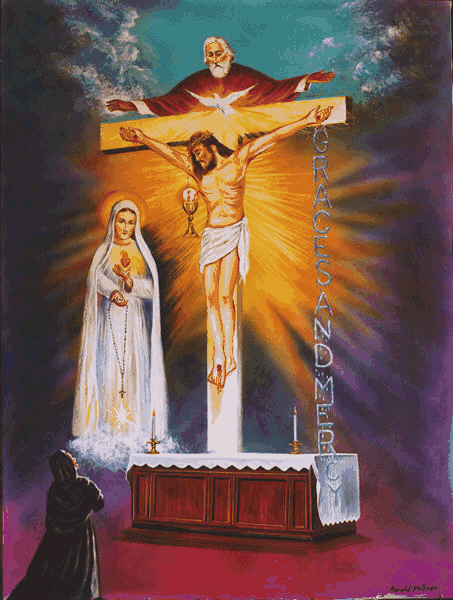
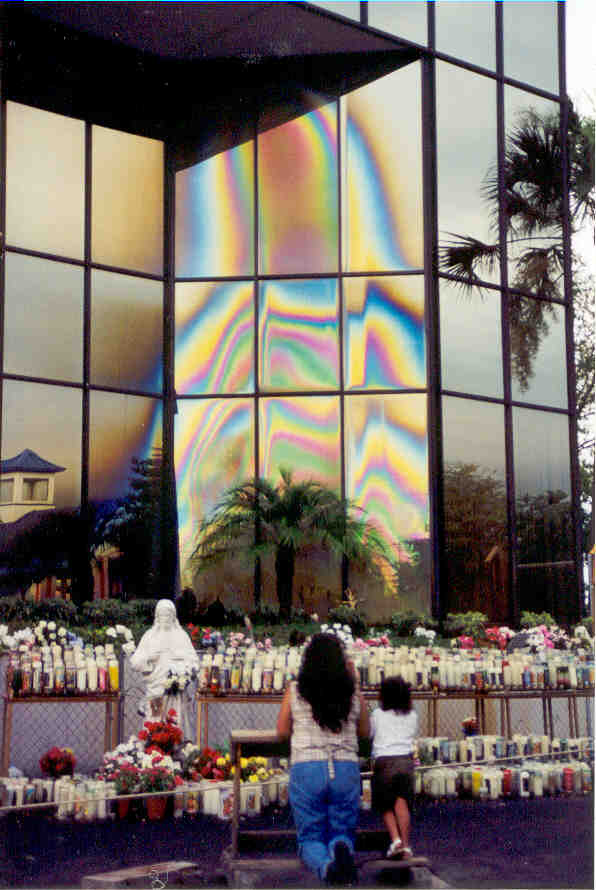
A Rosary for Healing or for Someone
with Cancer.
On one Hail Mary bead or as many as you desire, say: (this is given for Fr. Carter, you
can replace your loved one's name).
May God heal Fr. Carter through the intercession of Our Lady of Clearwater in
union with the Mass and all the Masses being celebrated around the world.
Pray the Hail Mary or Hail Mary's then pray this after the Hail Mary.
May the cancer be uprooted and thrown into the sea.
We believe with all our hearts.
After the Glory Be— pray the following petition.
May Fr. Carter be healed through the intercession of Our Lady of Clearwater
if it be the holy will of God.
 |
Note: You can look at Mary on the image rosary while you pray this rosary. |
 |
Note: The above section can be printed out from a PDF file, and you can pray the rosary looking at
the pictures.
Messenger: CAN YOU HELP US BY GIVING US ROSARIES FOR THE SCHOOLS
REQUESTING THEM?
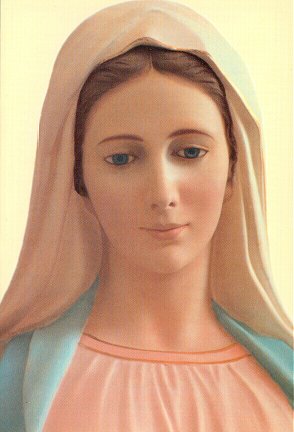
Mary speaks: PLEASE MAKE WALTER'S ROSARIES. THE
SCHOOLS WANT ROSARIES AND THERE ARE NOT ANY ROSARIES LEFT.
Messenger: Social at the Morrow, Ohio, Center after 6:20 p.m.
prayers and rosary on Friday, November 17, 2000.
Messenger: There will be a special rosary in Sidney, Ohio, at
6:20 p.m. on Tuesday, November 21, 2000. Please call 1-888-211-3041 for more information.
Messenger:
Rosary in Clearwater, Florida - December 5, 2000.
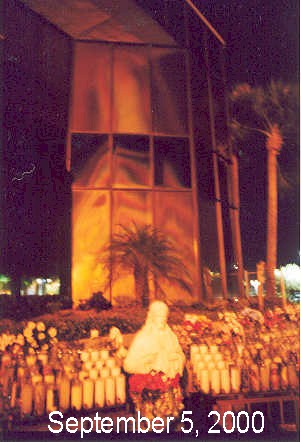
Messenger: ALL APOSTLES THAT CAN COME ON DECEMBER 17, 2000 TO FLORIDA
- 4TH ANNIVERSARY OF MARY'S APPARITION ON THE BUILDING IN CLEARWATER, FLORIDA.
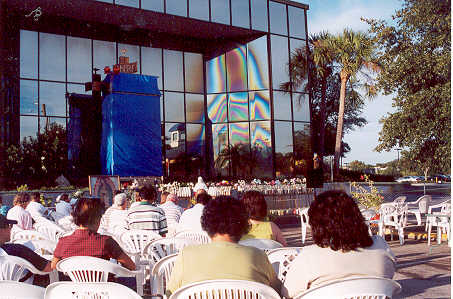
Messenger: Mary wants the Red Rosary Book printed. It will cost
$12,000 - $14,000 to get them reprinted.

Messenger: Pray for Perry.
Prayer List for apostles for interior use in the
Movement. Pray hourly.
Spread the Blood of Jesus on everyone, consecrate their hearts, cast the devil
out, pray for coming of the Holy Spirit in a special way for all people involved on this
list.
Pray Father Carter is healed through Our Lady of Clearwater.
Pray for Father Carter's doctors.
Please pray for one new very important intention.
Pray for all involved in buying the building.
Pray for designated priests, Fr. Mike, Fr. Smith, Fr. Ken, all priests involved in the Imprimaturs
translations including all bishops. Pray for Fr. Joe, Bishop Ed, Fr. Don, Father at
Tuesday Masses, Fr. Tom, Fr. Bill, all priests involved with Walter, Fr. Hagee and special
priests.
Pray for Father's sister Merle, for all of us servants, handmaids, apostles and vocations
to all 7 categories.
Pray for the elections.
Pray for an audience with the Pope.
Pray for all Jesuits involved, all those over us. Pray for the 4 urgent intentions.
Pray for the rights to the books.
Pray for the process of getting Father's books on the Internet.
Pray for money to reprint the books.
Pray for the Imprimatur on the Priestly Newsletter Book II.
Pray we can send it to all bishops and Jesuits.
Pray for Perry and family and discernment.
Pray for all sub-centers and all out-of-state rosaries.
Pray for the sisters' mailing, nursing home mailing, bus mailing.
Pray for Rosary Factory.
Pray for Genevieve's daughter and Sheila's mom and Jerry's dad, Bernice's daughter.
Pray for Paul and Joan discernment.
Pray for all book covers.
Pray for B & M and Tina and Terry, all printing jobs, companies involved.
Pray for 5th, the 13th, the 17th.
Pray for the Internet team and the daily messages.
Pray for building up of Morrow, Ohio, Dale, Indiana, other sub-centers.
Pray for the Holy Spirit Center and all involved.
Pray for all our families, children in school, college mailing.
Pray for lots of rosary makers and rosaries for the schools.
Pray for funds and grace.
Pray for Paul C., Margaret Mary, Steve and Sheila, Monica, Angie, Marian, Cathy, Joe,
Nick, Mary, Emily, Joe, Doris, Dunkers, Joan R., Morgan, Mark, Walter, Janice, Mike
A., Margaret, Ron, and Harold.
Pray for Fred doing the paper and all involved in priestly "start-up".
Please pray for all Shepherds of Christ children.

(Please copy and pass out to family and friends.)
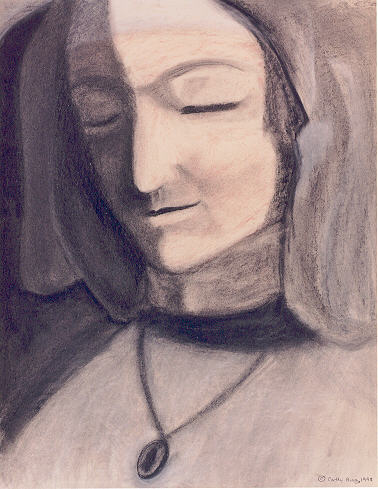 Mary's
Message from the Rosary of August 27, 1996
Mary's
Message from the Rosary of August 27, 1996
Mary speaks: I stood beneath the cross
of my Son, and my Heart was in such pain for I saw Him before my eyes. I saw Him covered
with blood. I saw Him die. My Heart, my children, my Heart to watch my Son, but my Heart,
my Heart, how I suffered for my little children of the world that give in to this world
and give up the love of my Son. O my little children of light, I give you this message.
Carry this light into the darkness for your Mother Mary, for I stood beneath the cross and
I cried. I cried for the little ones. I cried for the young ones, the ones that do not
care and will lose their souls. How do I make you see for you will not listen to me? What
can I do? I come. I appear. I beg. I plead. I give you these gifts from my Son, and you
reject me. I do not deliver messages very often anymore for I have been ignored. The
message is the same. You do not read the messages I have given to you. Please help me.
Help the little children. I appear. I appear. I appear, and I am ignored. I stood beneath
the cross, and I cried. I cried, and my Heart was in such anguish for my little children,
for I am searching for them this day as I searched for the Child Jesus. Please, please
help me. I cannot hold back the hand of my Son any longer. I am Mary, your Mother. I ask
you to help my children. You are my children of light.
Song: O Lady of Light, shining so bright,
be with us this day, guiding our way, O Lady, O Lady of Light.
Mary speaks: I appear to you as
Our Mother of Sorrows.
(End of Mary's Message)
MY
VALENTINE FOR JESUS AND MARY
AND THE WORLD
I _________________ give my
heart to
You Jesus and Mary on this day
_________________
I promise to help spread the devotion to
the Hearts of Jesus and Mary.
   |
Question for married couples and others in intimate
relationships:
Q: How do I feel in my heart when I am divided with you?
Table of Contents
Previous Daily Message
Main Shepherds of Christ Page
 Copyright
© 2000 Shepherds of Christ.
Copyright
© 2000 Shepherds of Christ.
Rights for non-commercial reproduction granted:
May be copied in its entirety, but neither re-typed nor edited.
Translations are welcome but they must be reviewed for moral and theological accuracy by a
source approved by Shepherds of Christ Ministries before any distribution takes place.
Please contact us for more information.
All scripture quotes are from the New Jerusalem Bible, July 1990, published by Doubleday.
Revised: November 18, 2000
URL: http://www.SofC.org
Contact Information for Shepherds of Christ
Email: info@SofC.org
Shepherds of Christ Ministries
PO Box 193
Morrow, Ohio 45152-0193
Telephone: (toll free) 1-888-211-3041 or (513) 932-4451
FAX: (513) 932-6791








 the immanent expression of God's fullness, the reflection of the
Father. Likewise, from all eternity, the Father and the Son bring forth the Holy Spirit in
a perfect act of loving.
the immanent expression of God's fullness, the reflection of the
Father. Likewise, from all eternity, the Father and the Son bring forth the Holy Spirit in
a perfect act of loving. the Word made flesh, the life of the Trinity has incarnationally manifested
itself to mankind. The life of the Trinity centers in the personal relationships between
Father, Son, and Holy Spirit; but God's life is also his love gone out to the human race.
The Incarnation projects this Trinitarian life into the temporal sphere. Jesus has come to
tell us about Trinitarian life, to give us a share in it, to teach us that through grace
we share in God's life—a life of relationships—by entering into deepened
personal relationships with God and other persons. Redemption that is received and
contributed to is the experience of these relationships. In other words, as Jesus has told
us, the Christian life is summed up in love of God and neighbor. Out of these personalized
love relationships flow many things; for example, redemption continued is the loving
abandonment to the love of God that despite possible fear, allows a person to accomplish
things that are totally beyond his or her natural courage. Or again, redemption continued
is loving those who are afar off whom I will never see or know, but whom I know are my
brothers and my sisters and whom my work and prayer can reach out and touch. Or again,
redemption continued is the Christian hope and trust that allows man and woman to take the
risk of the mutual self-giving that is marriage. Or again, redemption continued is the
black person who continues to relate to his or her white neighbors in faith, hope, and
love despite temptations to hatred and bitterness. Or again, redemption continued is the
ecstasy and the agony of loving and being loved. Truly, the Incarnation visibly continued
is our Christian faith, hope, and love made alive in our personal relationships with God
and man.
the Word made flesh, the life of the Trinity has incarnationally manifested
itself to mankind. The life of the Trinity centers in the personal relationships between
Father, Son, and Holy Spirit; but God's life is also his love gone out to the human race.
The Incarnation projects this Trinitarian life into the temporal sphere. Jesus has come to
tell us about Trinitarian life, to give us a share in it, to teach us that through grace
we share in God's life—a life of relationships—by entering into deepened
personal relationships with God and other persons. Redemption that is received and
contributed to is the experience of these relationships. In other words, as Jesus has told
us, the Christian life is summed up in love of God and neighbor. Out of these personalized
love relationships flow many things; for example, redemption continued is the loving
abandonment to the love of God that despite possible fear, allows a person to accomplish
things that are totally beyond his or her natural courage. Or again, redemption continued
is loving those who are afar off whom I will never see or know, but whom I know are my
brothers and my sisters and whom my work and prayer can reach out and touch. Or again,
redemption continued is the Christian hope and trust that allows man and woman to take the
risk of the mutual self-giving that is marriage. Or again, redemption continued is the
black person who continues to relate to his or her white neighbors in faith, hope, and
love despite temptations to hatred and bitterness. Or again, redemption continued is the
ecstasy and the agony of loving and being loved. Truly, the Incarnation visibly continued
is our Christian faith, hope, and love made alive in our personal relationships with God
and man.








 Mary's
Message from the Rosary of August 27, 1996
Mary's
Message from the Rosary of August 27, 1996

